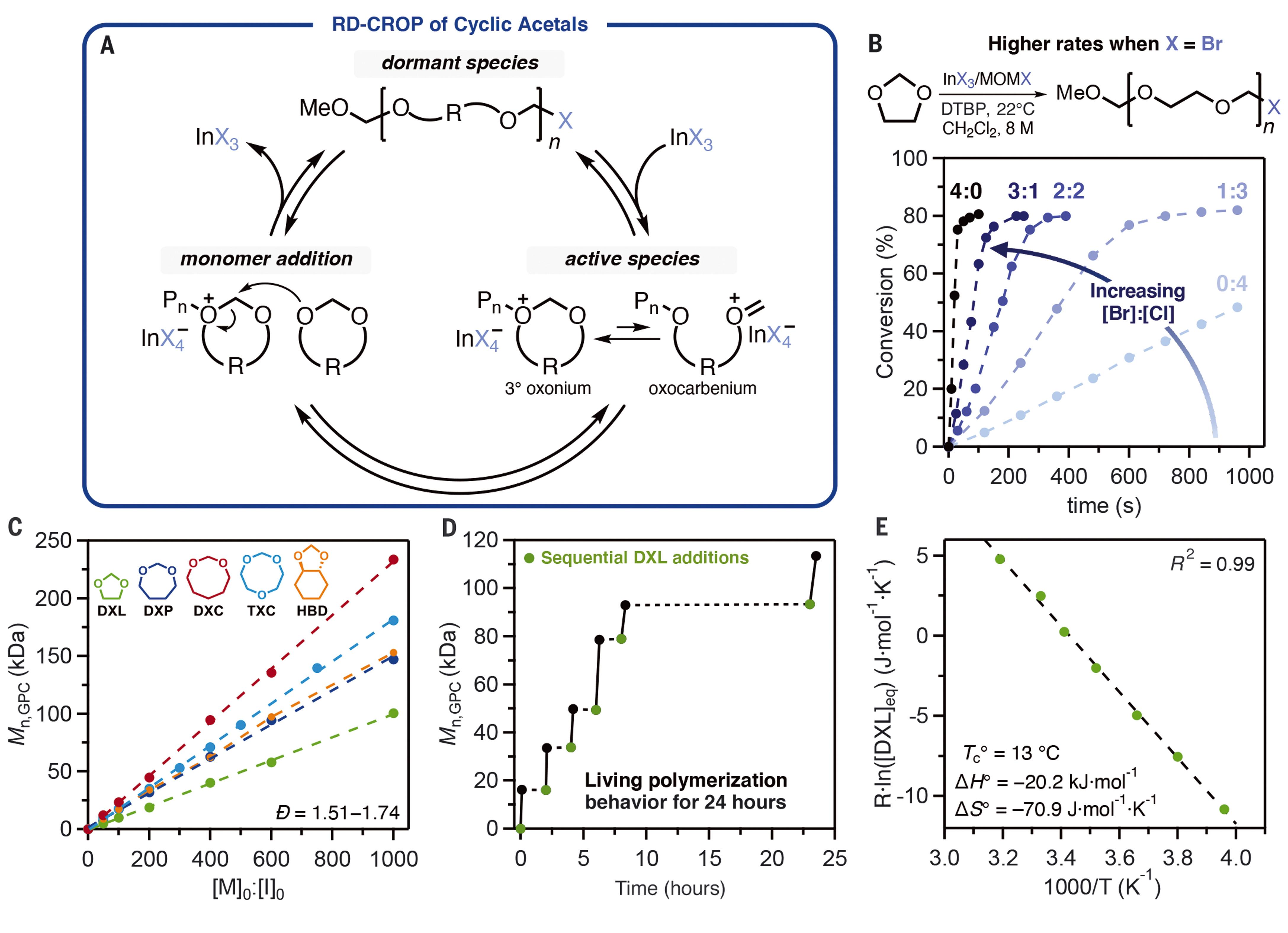Chemically recyclable thermoplastics from reversible-deactivation polymerization of cyclic acetals
IF 44.7
1区 综合性期刊
Q1 MULTIDISCIPLINARY SCIENCES
引用次数: 109
Abstract
Identifying plastics capable of chemical recycling to monomer (CRM) is the foremost challenge in creating a sustainable circular plastic economy. Polyacetals are promising candidates for CRM but lack useful tensile strengths owing to the low molecular weights produced using current uncontrolled cationic ring-opening polymerization (CROP) methods. Here, we present reversible-deactivation CROP of cyclic acetals using a commercial halomethyl ether initiator and an indium(III) bromide catalyst. Using this method, we synthesize poly(1,3-dioxolane) (PDXL), which demonstrates tensile strength comparable to some commodity polyolefins. Depolymerization of PDXL using strong acid catalysts returns monomer in near-quantitative yield and even proceeds from a commodity plastic waste mixture. Our efficient polymerization method affords a tough thermoplastic that can undergo selective depolymerization to monomer.

环缩醛可逆失活聚合产生的化学可回收热塑性塑料
确定能够进行单体化学回收(CRM)的塑料是创建可持续循环塑料经济的首要挑战。聚缩醛很有希望成为 CRM 的候选材料,但由于目前使用的不可控阳离子开环聚合(CROP)方法产生的分子量较低,因此缺乏有用的拉伸强度。在此,我们介绍了使用商用卤代甲醚引发剂和溴化铟(III)催化剂对环状乙醛进行可逆失活 CROP 的方法。利用这种方法,我们合成了聚(1,3-二氧戊环) (PDXL),其拉伸强度可与某些商品聚烯烃媲美。使用强酸催化剂对 PDXL 进行解聚后,单体的产量接近定量,甚至可以从商品塑料废料混合物中进行解聚。我们的高效聚合方法提供了一种可选择性解聚成单体的坚韧热塑性塑料。
本文章由计算机程序翻译,如有差异,请以英文原文为准。
求助全文
约1分钟内获得全文
求助全文
来源期刊

Science
综合性期刊-综合性期刊
CiteScore
61.10
自引率
0.90%
发文量
0
审稿时长
2.1 months
期刊介绍:
Science is a leading outlet for scientific news, commentary, and cutting-edge research. Through its print and online incarnations, Science reaches an estimated worldwide readership of more than one million. Science’s authorship is global too, and its articles consistently rank among the world's most cited research.
Science serves as a forum for discussion of important issues related to the advancement of science by publishing material on which a consensus has been reached as well as including the presentation of minority or conflicting points of view. Accordingly, all articles published in Science—including editorials, news and comment, and book reviews—are signed and reflect the individual views of the authors and not official points of view adopted by AAAS or the institutions with which the authors are affiliated.
Science seeks to publish those papers that are most influential in their fields or across fields and that will significantly advance scientific understanding. Selected papers should present novel and broadly important data, syntheses, or concepts. They should merit recognition by the wider scientific community and general public provided by publication in Science, beyond that provided by specialty journals. Science welcomes submissions from all fields of science and from any source. The editors are committed to the prompt evaluation and publication of submitted papers while upholding high standards that support reproducibility of published research. Science is published weekly; selected papers are published online ahead of print.
 求助内容:
求助内容: 应助结果提醒方式:
应助结果提醒方式:


